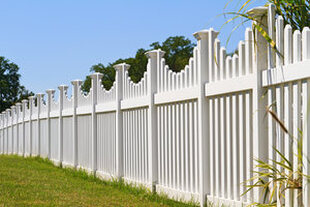Vinyl fence installation Milton, ON
Milton Fence is proud to provide quality vinyl fence installations by experienced and reliable fence contractors who have been providing expert fencing services for a number of years.
One of the popular fencing materials aside from wood in recent years is vinyl. Cheap vinyl is to be avoided at all costs, as all the benefits and features of quality vinyl are practically negated with low grade vinyl, which surprisingly, some contractors still insist on using to lower costs. Low quality vinyl is prone to damage from UV rays and extreme temperature fluctuations, making it susceptible to crack and break. We at Milton Fence, however, insist on using only quality vinyl or PVC fencing materials because we care about fostering and maintaining a positive relationship with our clients, and that is achieved by providing quality vinyl fence installation services using the best materials and focusing on customer service. So let’s dive in a little on what makes (good quality) PVC or vinyl fencing great. Here are a few reasons why:
|
- Long lifespan: with proper care and maintenance, a good vinyl fence can last decades without looking tired or worn.
- Good value: although vinyl planks can potentially be pricier than cheaper wood species, the cost for installation is lower because it’s easier and faster to install vinyl fencing compared to wood fencing. The value is also there in the sense that you’re looking at a very infrequent repair and replacement schedule, so the cost throughout the lifespan is brought down significantly.
- Excellent privacy fencing: although wood enclosures also provide good privacy, one of the benefits of vinyl is that it doesn’t expand and contract with temperature fluctuations, and so privacy is maintained through minimal to no spacing between planks, and doesn’t tend to warp.
- Rot resistance: because vinyl is an artificial material, it is not susceptible to termite infestation.
Vinyl has many great features, although some die-hard wood fans may highlight a few negatives such as: its negative environmental footprint, its synthetic appearance and others. Composite fencing is another alternative where recycled vinyl and wood fibers are combined to create a strong and durable fence system that features many of the benefits of both types of materials and minimizes the drawbacks of both. Whatever material you decide should ultimately be based on your priorities, your budget, your preference and your knowledge of what each material provides.
Milton Fence ensures that whether our fence contractors install a wood fence, a vinyl fence or composite fence, we have some guidelines we always stick by. Build and install a fence or deck that makes sure the customers’ preferences are respected, while constructing an enclosure that is suitable for that environment. That latter is achieved through educating the client as well as effective communication. We’re confident you’ll see this when we get the chance to work on your next vinyl fencing project.


